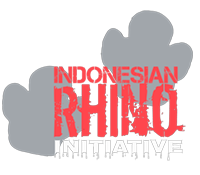An important step has been taken by the Indonesian Rhino Initiative (IRI) in maintaining environmental sustainability around the Way Kambas National Park. By launching the ecoprinting program, we are not only targeting the protection of endangered animals such as rhinos, but also paying attention to the welfare of local communities.
Ecoprinting is a creative art form that combines natural resources with techniques for printing motifs on fabric using organic materials. The ecoprinting process involves using leaves, flowers, tree bark, or other natural materials to create uniquely beautiful patterns. Some of the leaves used to print motifs on cloth are food from rhinos grown in people’s yards. Through this technique, leaves and other organic materials are used to print unique natural motifs on fabric, creating products of high artistic value with an environmental impact.
In order to make an ecoprint the women first need to create a dye or “potion” using natural ingredients, that will be used as a soaking agent for the main fabric. They then arrange locally grown leaves and flowers on the fabric and roll it in a blanket that works as a color printer, along with black plastic. Once rolled, the fabric is boiled in water for two hours then dried and unraveled, revealing the striking colors and natural designs that have been printed onto the fabric.
Indonesian Rhino Initiative conducted ecoprint training in two villages surrounding Way Kambas National Park, the first Labuhan Ratu 7 village and Rantau Jaya Baru village, which is these villages are two buffer villages of Way Kambas National Park in Sumatra. The two day training teaches local residents, primarily women, of the forest farmer group how to make an “ecoprint” from start to finish. The products produced are also diverse, such as clothing, paintings, lanyards, scrafs, and many more.
Reaction from the local community was very positive. They not only see this program as an opportunity to increase their income, but also as a real step in protecting the environment where they live.
This is in line with IRI’s expectations in holding this program to generate a revenue source for the community while creating incentive for forest restoration and protection within Way Kambas National Park, home to critically endangered Sumatran rhinos. By involving them in the entire process, from collecting raw materials to marketing finished products.

